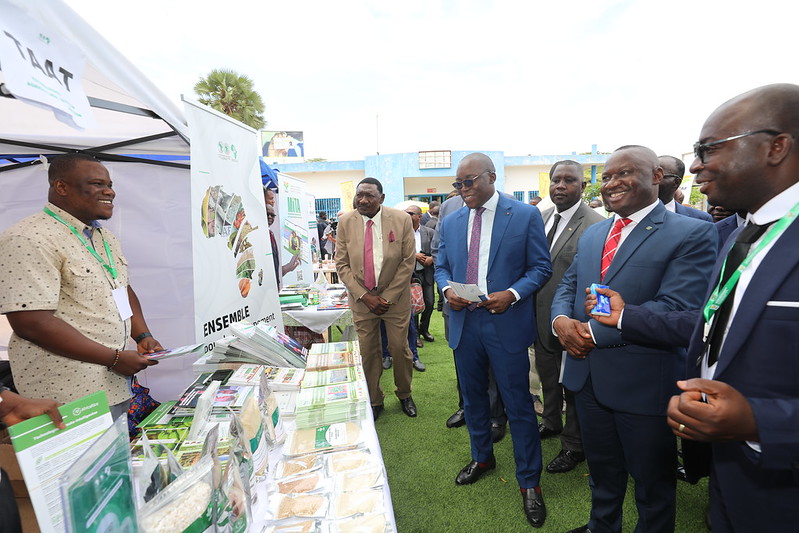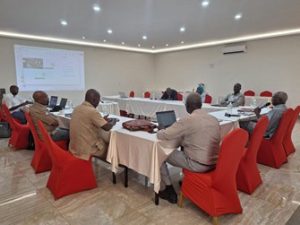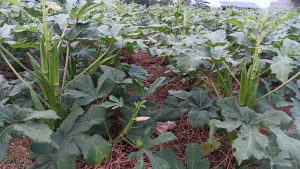TOGO: TAAT underscores technologies and innovations for Integrated management of plant and animal pests and diseases

In line with efforts at integrating food systems initiatives with sub-regional organisations, Technologies for African Agricultural TAAT engaged stakeholders and participants at the fourth edition of the Agricultural Innovation and Technology Marketplace (MITA) from 21st to 26th October 2024, at the 2 Fevrier Hotel in Lomé, Togo.
Organised by the West and Central African Council for Agricultural Research and Development (CORAF), this year’s MITA edition provided opportunities for TAAT and other CORAF partners to enhance access to and widespread adoption of agricultural technologies throughout West and Central Africa.
Dr Solomon Gizaw, head of the TAAT Clearinghouse, in a presentation on innovative technologies for Integrated management of plant and animal pests and diseases, highlighted TAAT’s focal commitment to providing free and extensive access to a suite of proven and path-breaking technologies that address emerging plant and animal pests and diseases through its electronic repository called the ecatalogs.
The third edition of MITA served as a vital platform for exchanging technological insights and innovations from TAAT, catering to the interests of the general public and agricultural professionals. It included B-to-B sessions and forums, offering an invaluable opportunity to showcase TAAT innovations and technologies capable of revolutionising agriculture and contributing to heightened food security.
Organised in partnership with the government of Togo and the Togolese Institute of Agronomic Research (ITRA), MITA 2024 brought together key players in research, innovation and agricultural development to promote the adoption of innovative solutions in West and Central Africa.
Under the high patronage of the Minister of Agriculture, Hydraulics and Rural Development of Togo, Antoine Lekpa Gbegbeni, MITA 2024 provided an essential platform for “interaction between the different actors, aimed at improving food security” in the two subregions of the continent.
The various exhibition stands offered visitors the opportunity to discover seeds, processed products, climate-smart technologies and innovative solutions ready to contribute to food security in West and Central Africa.
MITA 2024 also proved to be a unique avenue to encourage technological innovations in agriculture and carried out by young actors, an orientation decided during the 1st edition of the West and Central African Youth Summit.
Established in 2018 as a central pillar of the African Development Bank’s Feed Africa strategy, TAAT represents a transformative initiative to reverse the trend of declining food productivity in Africa through the scaling of modern food production technologies to 40 million farmers across Africa, focusing on supporting young people and women in low-income regions.
TAAT has scaled up the dissemination of heat-tolerant wheat varieties, drought-tolerant maize, high-yielding rice, cassava, high-iron bean, sorghum, millet, orange-fleshed sweetpotato varieties and high-quality livestock breeds, and fingerlings to more than 12 million farmers, boosting crop production by an estimated 25 million tonnes. This increase in food production is a testament to the programme’s effectiveness in enhancing agricultural productivity across the continent.
TAAT acquires cutting-edge technologies from developers and agricultural research institutions led by the CGIAR for several agricultural value chains covering crops, livestock and fisheries, vets them for scaling readiness and integrates them into its electronic technology catalogue.
TAAT engages governments to integrate proven technologies into their large-scale agricultural investment programmes and partner with the private sector to commercialise them.
Recent Stories
Related Stories
- Leaders acknowledge TAAT as a bold initiative to achieve a hunger-free world
- IsDB, TAAT and Partners strategise on Cassava value chain transformation
- How TAAT Orange-fleshed sweet potatoes sparked a wellness movement
- Kenya: TAAT Showcases Innovations Driving Africa’s Food Systems Transformation
- Kenya: TAAT holds ToT Workshop on Soybean Agronomy, Seed Production and Entrepreneurship






